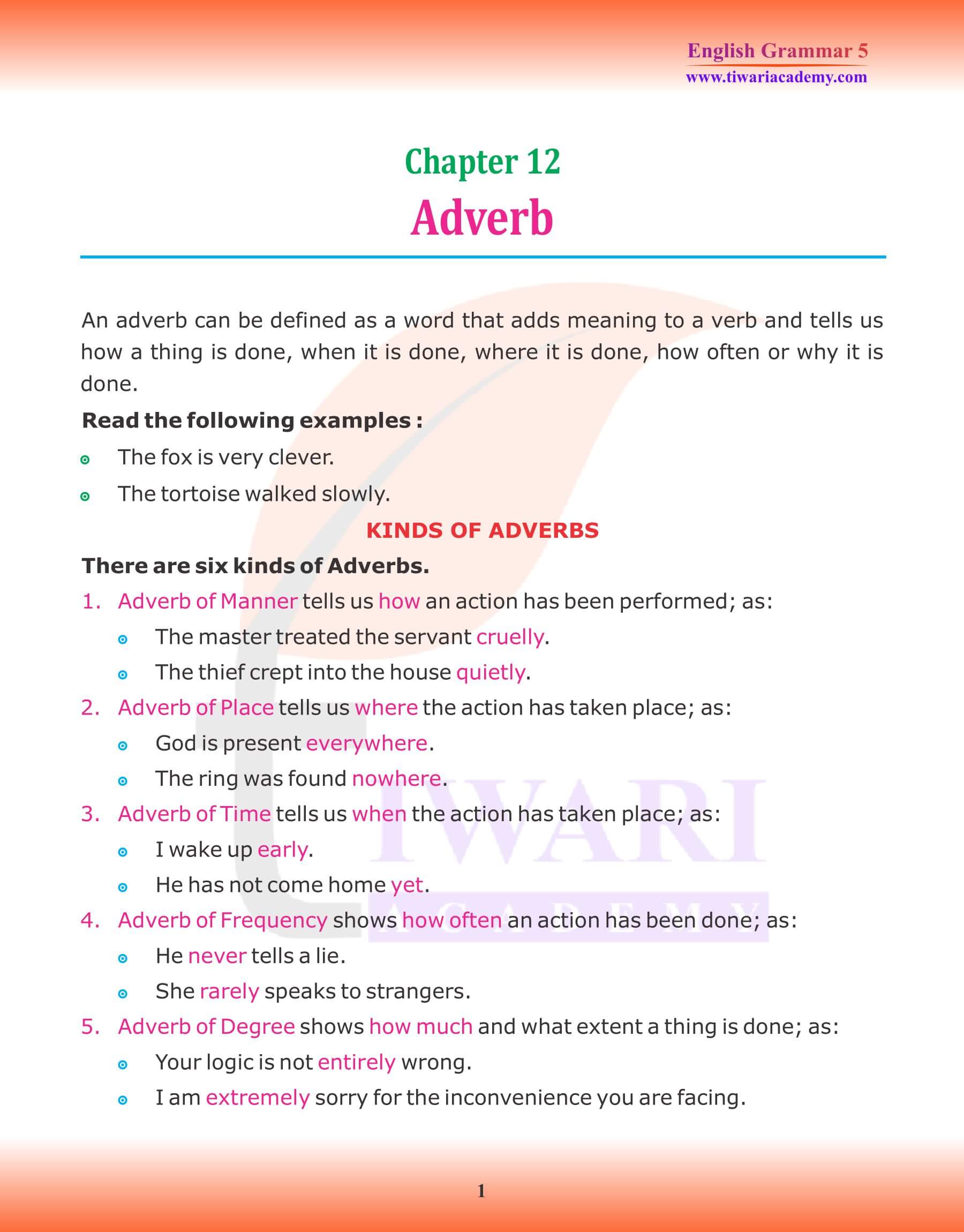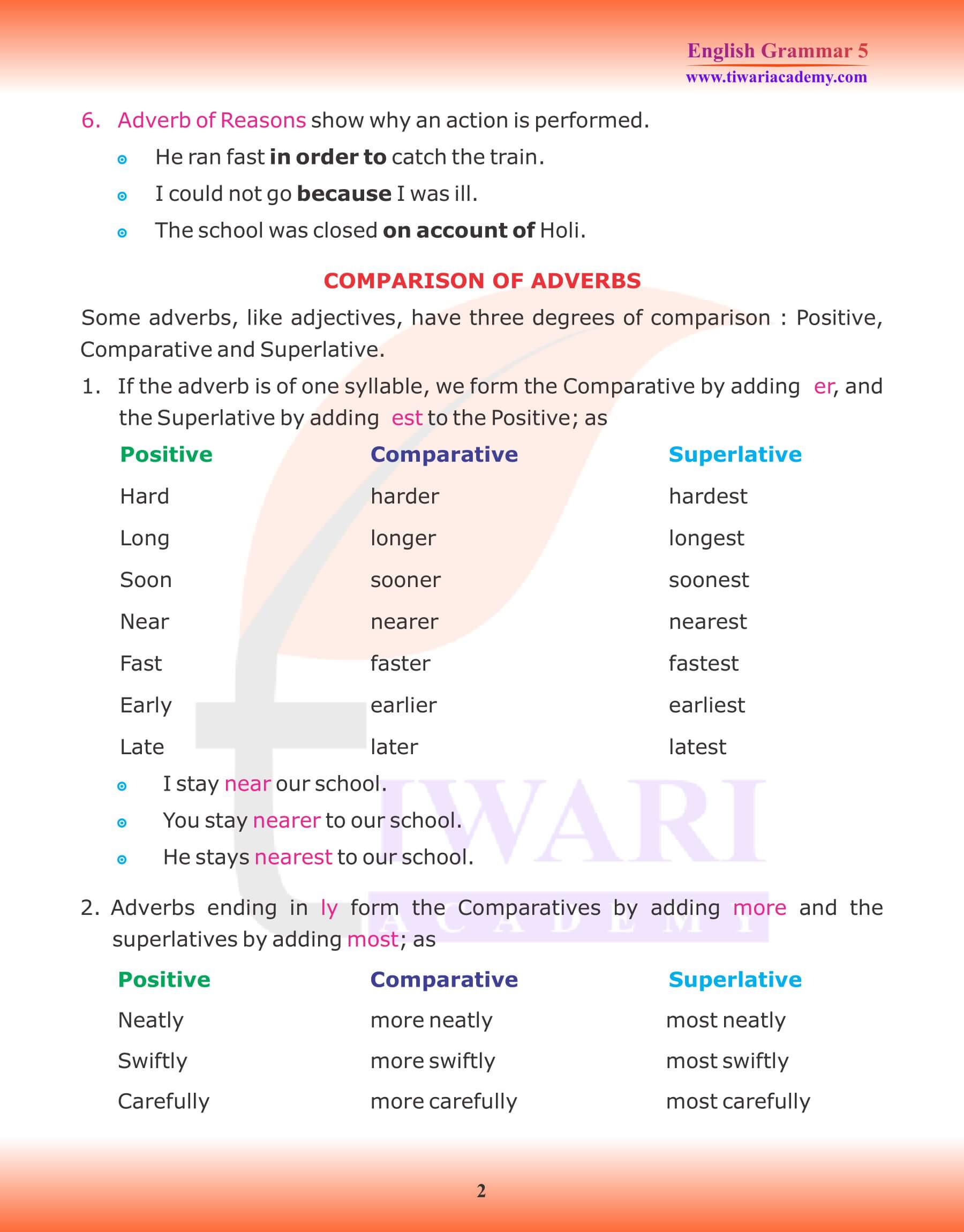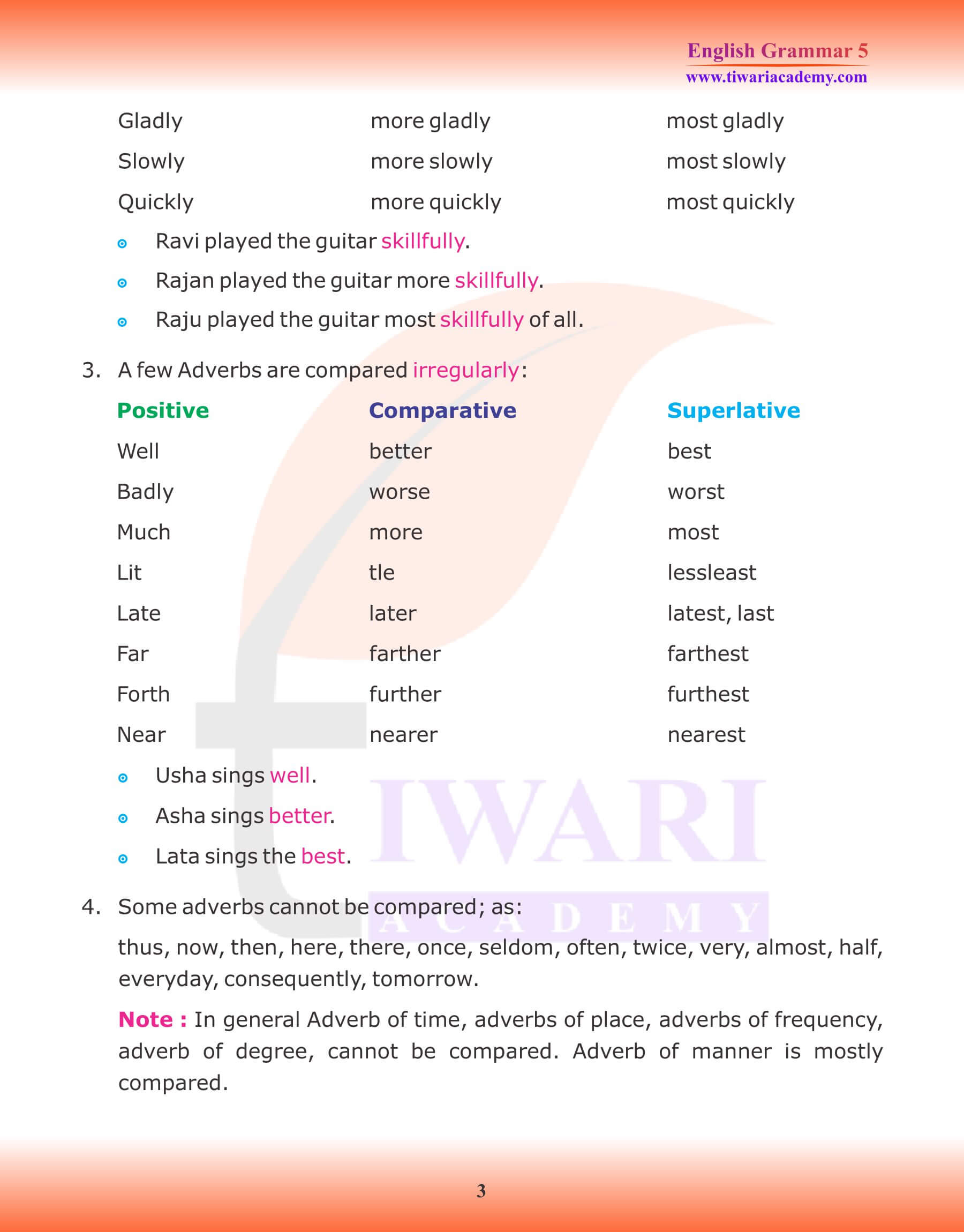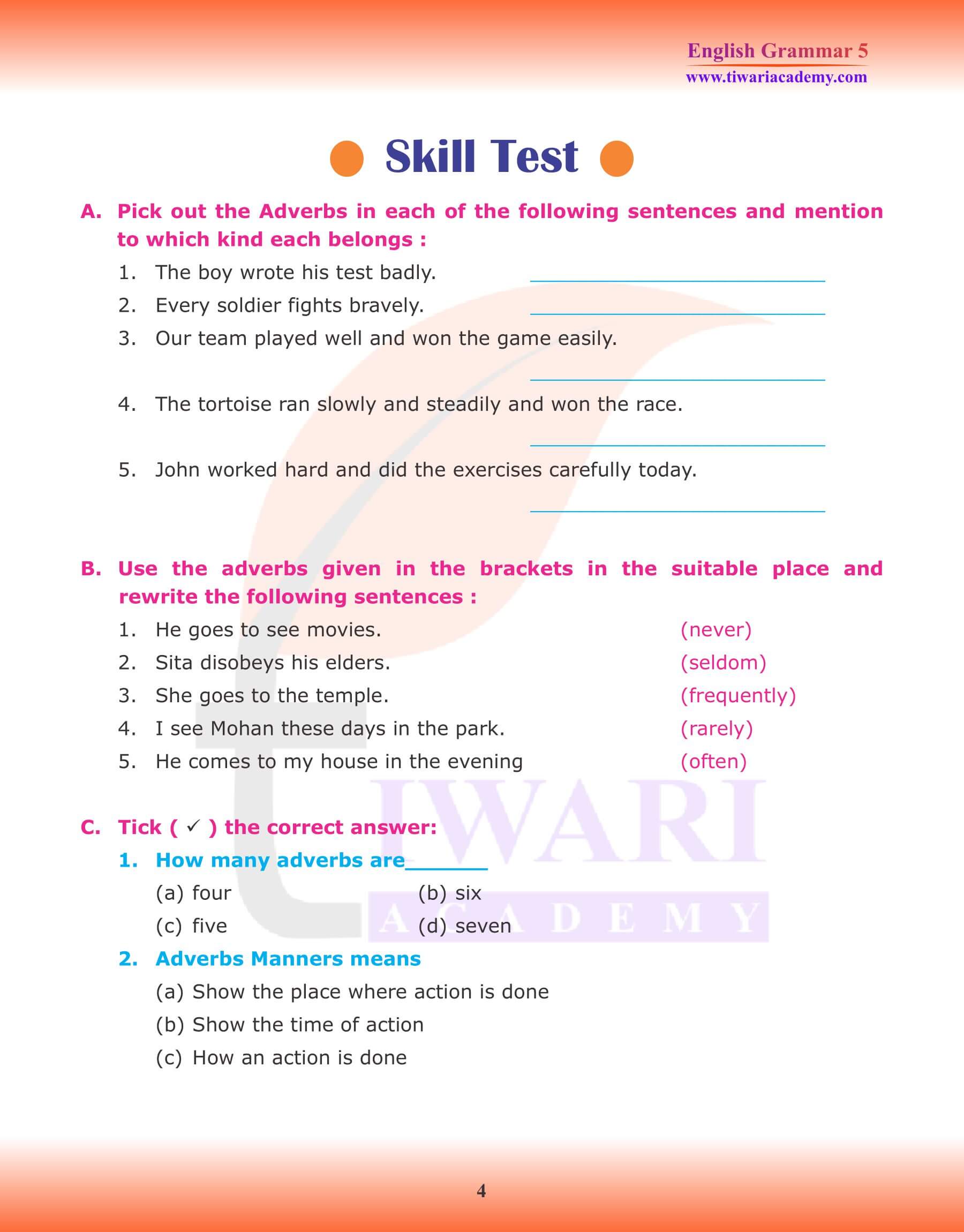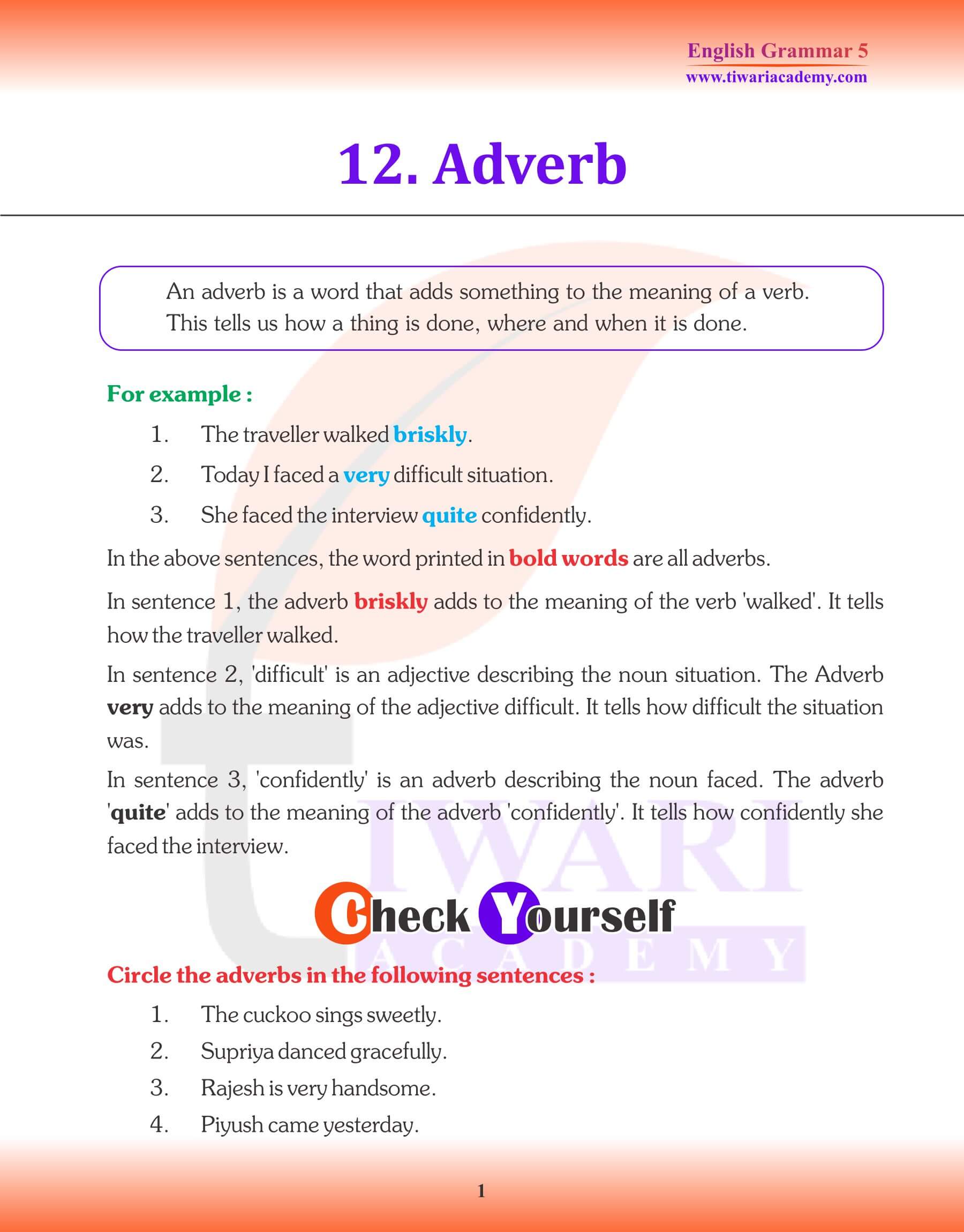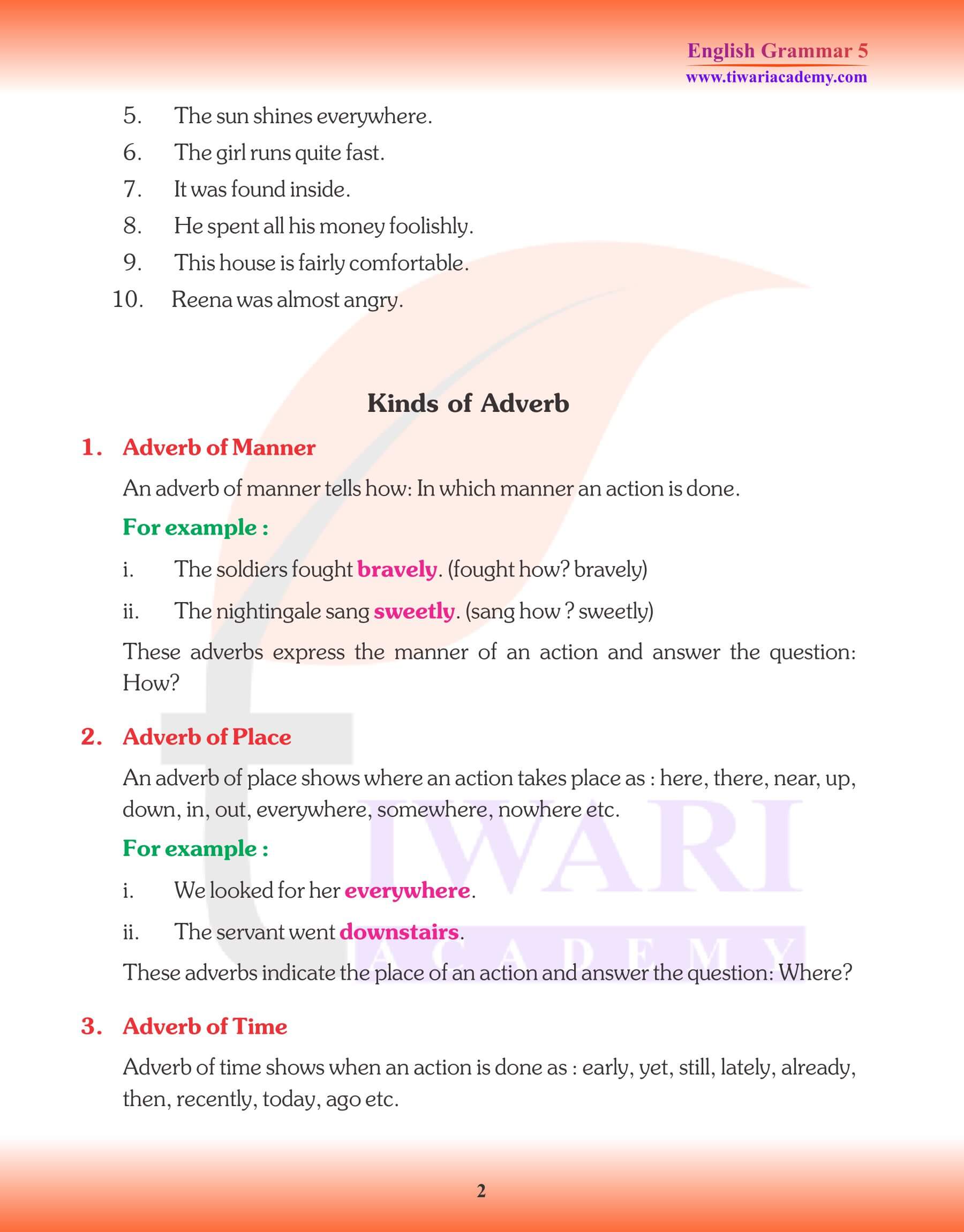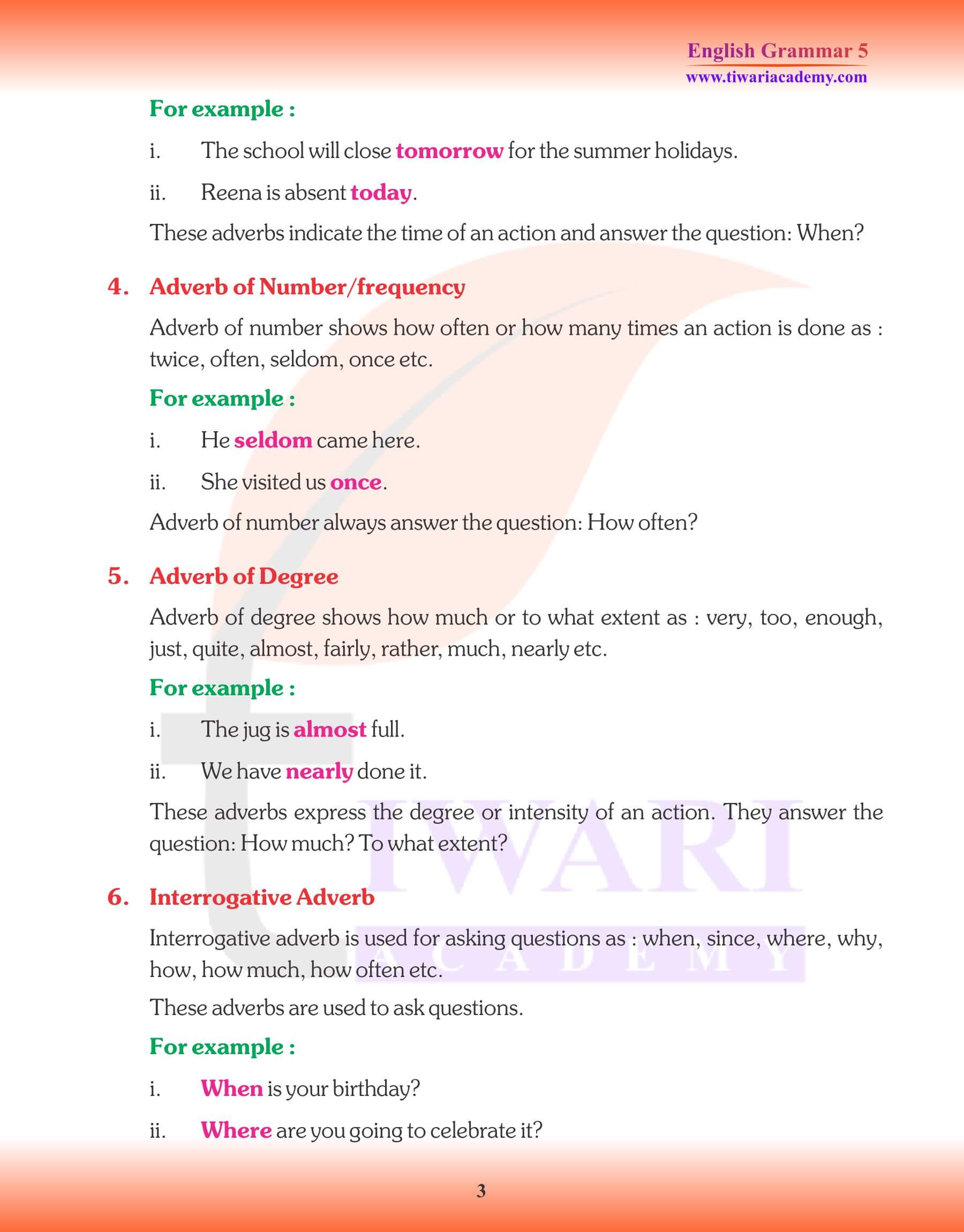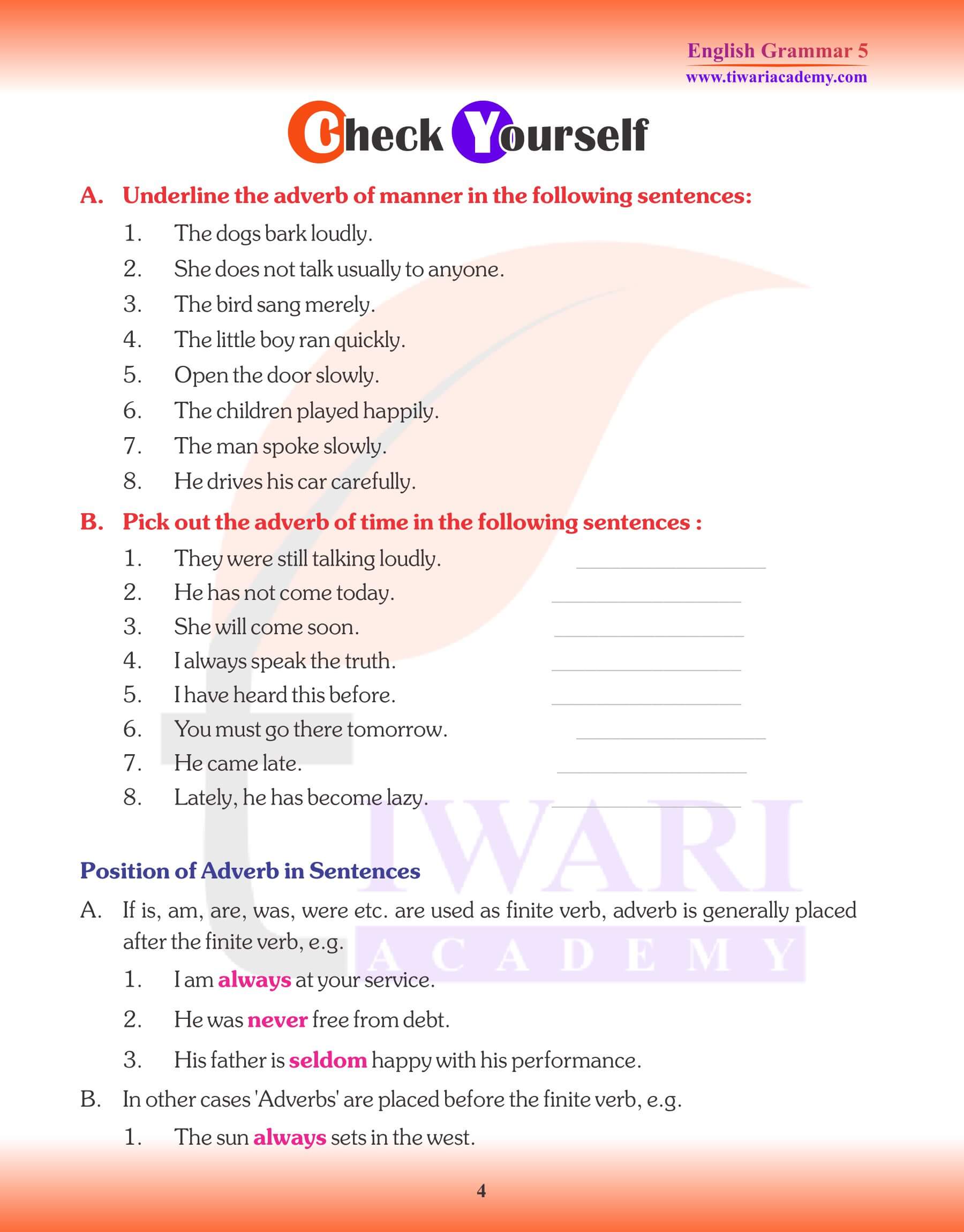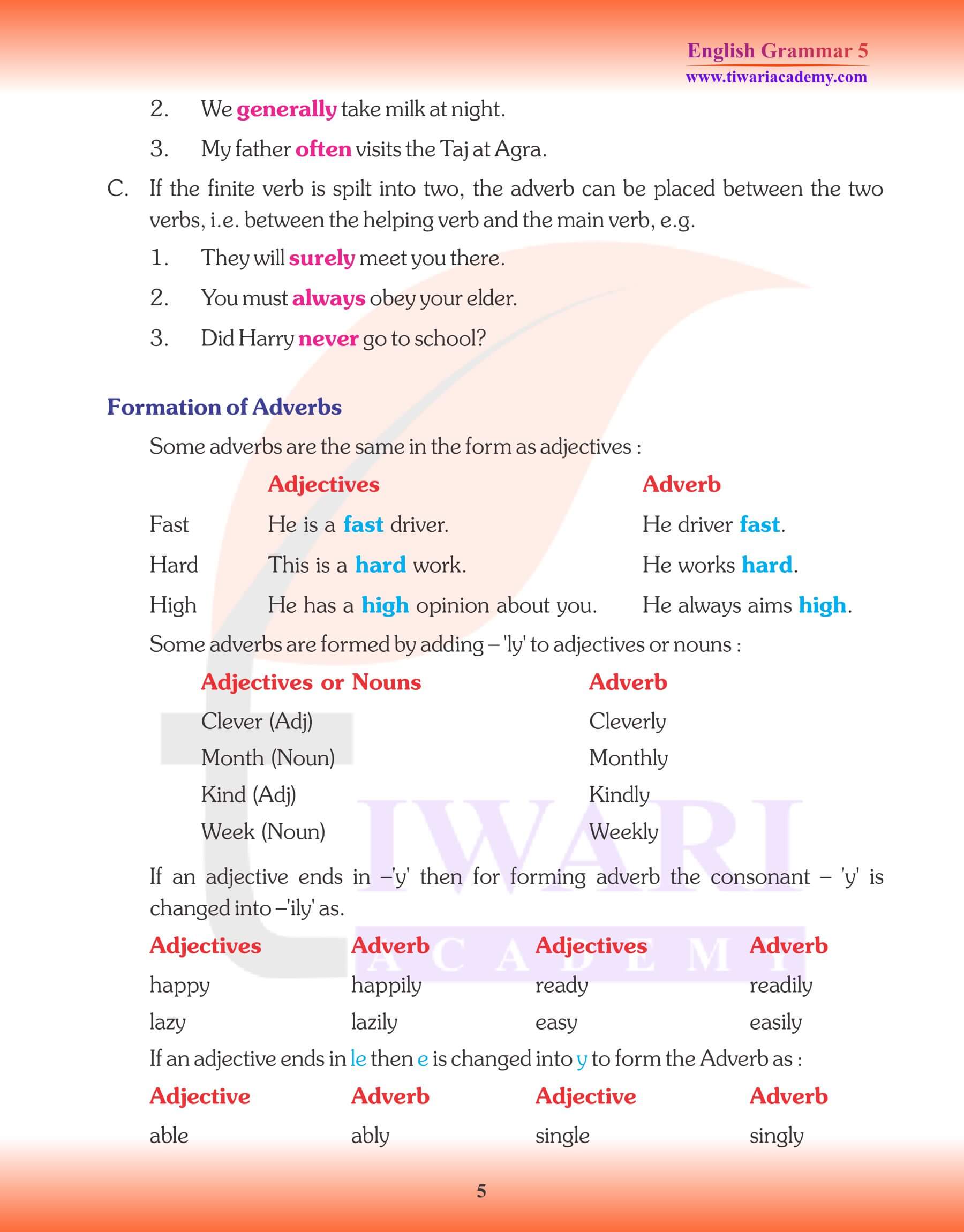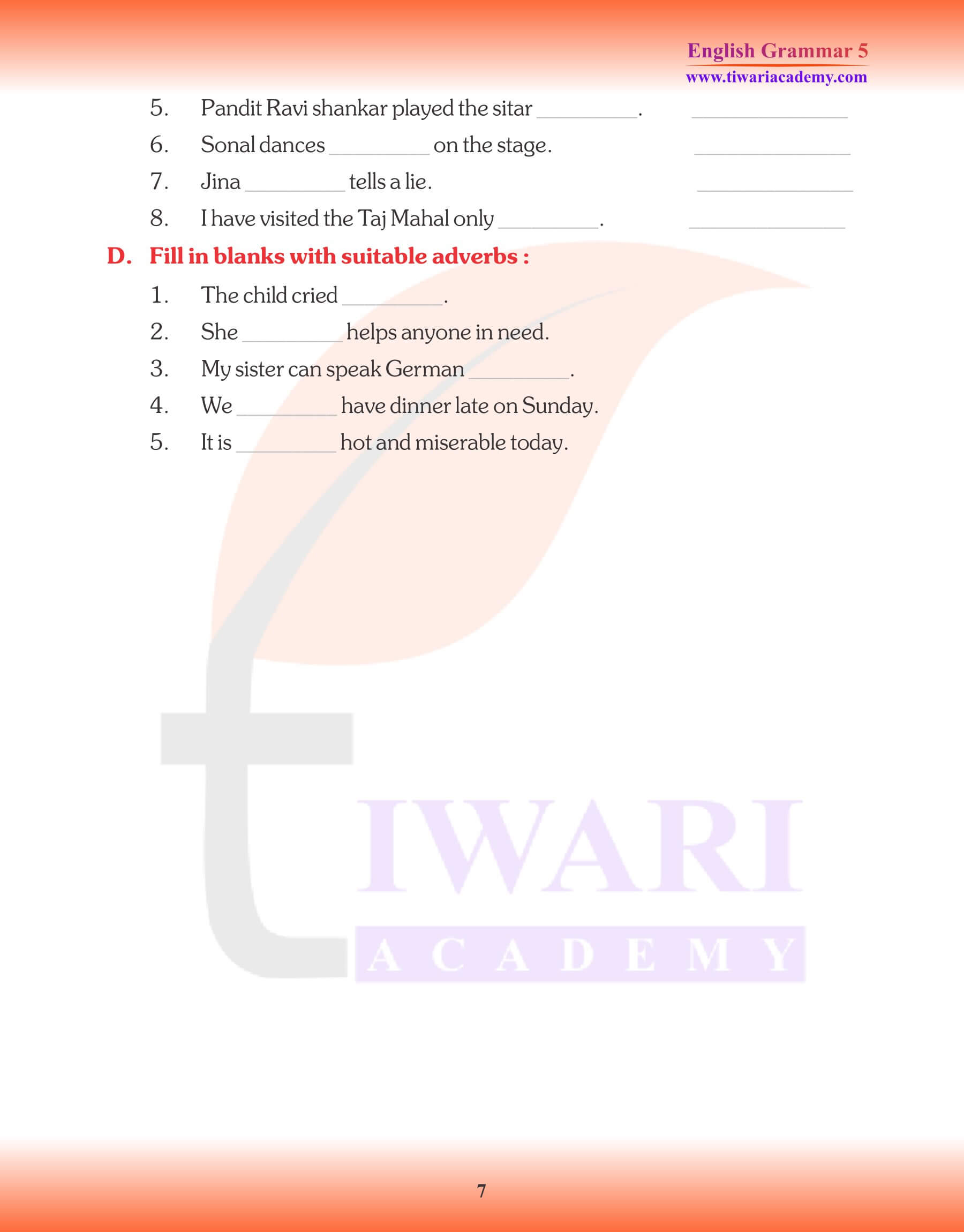NCERT Solutions for Class 5 English Grammar Chapter 12 Adverbs updated for academic session 2025-26 CBSE and State board students free to download or use online. An adverb can be defined as a word that adds meaning to a verb and tells us how a thing is done, when it is done, where it is done, how often or why it is done.
CBSE Contents for Class 5 English Grammar Chapter 12 Adverbs
Class 5 English Grammar Chapter 12 Adverbs
| Class: 5 | English Grammar |
| Chapter: 12 | Adverbs |
Kinds of Adverbs
There are six kinds of adverbs namely Adverb of Manner, Adverb of Place, Adverb of Time, Adverb of Frequency, Adverb of degree and Adverb of Reasons.
Adverb of Manner
Adverb of Manner tells us how an action has been performed; as:
The master treated the servant cruelly.
The thief crept into the house quietly.
Adverb of Place
Adverb of Place tells us where the action has taken place; as:
(i). God is present everywhere.
(ii). The ring was found nowhere.
Adverb of Time
Adverb of Time tells us when the action has taken place; as:
(i). I wake up early.
(ii). He has not come home yet.
Adverb of Frequency
Adverb of Frequency shows how often an action has been done; as:
(i). He never tells a lie.
(ii). She rarely speaks to strangers.
Adverb of Degree
Adverb of Degree shows how much and what extent a thing is done; as:
(i). Your logic is not entirely wrong.
(ii). I am extremely sorry for the inconvenience you are facing.
Adverb of Reasons
Adverb of Reasons show why an action is performed.
(i). He ran fast in order to catch the train.
(ii). I could not go because I was ill.
(iii). The school was closed on account of Holi.
COMPARISON OF ADVERBS
Some adverbs, like adjectives, have three degrees of comparison: Positive, Comparative and Superlative.
1. If the adverb is of one syllable, we form the Comparative by adding “er”, and the Superlative by adding “est” to the Positive; as:
| Positive | Comparative | Superlative |
|---|---|---|
| Hard | harder | hardest |
| Long | longer | longest |
| Soon | sooner | soonest |
| Near | nearer | nearest |
| Fast | faster | fastest |
| Early | earlier | earliest |
| Late | later | latest |
Ex.: I stay near our school. (Positive)
You stay nearer to our school. (Comparative)
He stays nearest to our school. (Superlative)
Adverbs ending in ly form the Comparatives by adding more and the superlatives by adding most; as:
| Positive | Comparative | Superlative |
|---|---|---|
| Neatly | more neatly | most neatly |
| Swiftly | more swiftly | most swiftly |
| Carefully | more carefully | most carefully |
| Gladly | more gladly | most gladly |
| Slowly | more slowly | most slowly |
| Quickly | more quickly | most quickly |
Ex.: Ravi played the guitar skillfully. (Positive)
Rajan played the guitar more skillfully. (Comparative)
Raju played the guitar most skillfully of all. (Superlative)
A few Adverbs are compared irregularly:
Examples:
Usha sings well. (Positive)
Asha sings better. (Comparative)
Lata sings the best. (Superlative)
| Positive | Comparative | Superlative |
|---|---|---|
| Well | better | best |
| Badly | worse | worst |
| Much | more | most |
| Little | less | least |
| Late | later | latest, last |
| Far | farther | farthest |
| Forth | further | furthest |
| Near | nearer | nearest |
Some adverbs cannot be compared
Ex.: Thus, now, then, here, there, once, seldom, often, twice, very, almost, half, every day, consequently, tomorrow.
Note: In general Adverb of time, adverbs of place, adverbs of frequency, adverb of degree, cannot be compared. Adverb of manner is mostly compared.
What is an adverb in Class 5 English Grammar Chapter 12?
An adverb can be defined as a word that adds meaning to a verb and tells us how a thing is done, when it is done, where it is done, how often or why it is done.
Examples:
(i). The fox is very clever.
(ii). The tortoise walked slowly.
How many kinds of Adverbs are there in Class 5 English Grammar Chapter 12?
There are six kinds of Adverbs:
1. Adverb of Manner
2. Adverb of Place
3. Adverb of Time
4. Adverb of Frequency
5. Adverb of Degree
6. Adverb of Reasons
What is degree of adverb in 5th standard English Grammar Chapter 12?
Some adverbs, like adjectives, have three degrees of comparison:
Positive, Comparative and Superlative.
Examples:
Hard harder hardest
Neatly more neatly most neatly
Well better best
